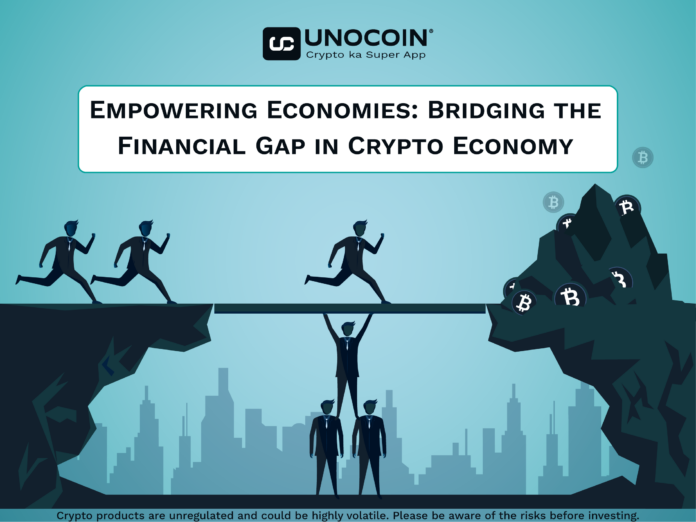Empowering Economies: Bridging the Financial Gap in the Crypto Economy
In the dynamic environment of finance, the emergence of the crypto-economy has brought transformative opportunities to strengthen economies around the world. Thanks to its decentralized nature and innovative technologies, the crypto-economy offers solutions to long-term financial challenges, bridging gaps and providing financial inclusion to previously underserved individuals and regions. In this survey, we delve into how the crypto-economy is empowering economies, breaking down barriers, and fostering a more inclusive and accessible financial ecosystem.
Financial inclusion through decentralization:
One of the key pillars of the crypto economy philosophy is decentralization. Traditional financial systems often exclude large sections of the population, especially in developing regions, due to factors such as insufficient access to banking infrastructure or regulatory barriers. Cryptocurrencies operating on decentralized networks provide individuals with the means to participate in the global economy without the need for traditional intermediaries. This decentralization not only enables peer-to-peer transactions but also opens the door to financial services for non-banks and non-banks.
Cross-border transactions and money transfers:
The crypto economy excels in facilitating cross-border transactions and money transfers. Traditional methods of transferring money across borders are often costly and time-consuming, especially for those in developing countries. Cryptocurrencies offer a faster and more affordable alternative. Through blockchain technology, users can send and receive funds globally with reduced fees and faster transaction times, allowing individuals and businesses to engage in international trade and finance without the constraints of traditional banking systems.
Microtransactions and fractional ownership:
Cryptocurrencies enable microtransactions, allowing users to efficiently send and receive small amounts of value. This capability is revolutionary for industries like content creation, where microtransactions can be used directly to support artists, writers, and musicians. In addition, blockchain technology facilitates fractional ownership and allows individuals to invest in assets traditionally considered inaccessible. This democratization of investment opportunities has the potential to reshape the distribution of wealth and provide financial empowerment to a wider range of people.
Decentralized finance (DeFi) as a catalyst:
Decentralized finance (DeFi) represents a paradigm shift in the traditional financial system by offering a wide range of financial services without relying on centralized intermediaries. Through blockchain-based smart contracts, DeFi platforms provide lending, borrowing and trading services, promoting financial inclusion by making these services available to anyone with an internet connection. The rise of DeFi has the potential to create a more inclusive and fair global financial system, providing opportunities for individuals previously excluded from traditional banking services.
Cryptocurrency as a hedge against economic instability:
In regions facing economic instability, cryptocurrencies offer a hedge against inflation and currency devaluation. Citizens of countries going through an economic crisis often turn to cryptocurrencies as a store of value that provides a degree of financial stability in the face of volatile national currencies. This use case demonstrates the potential of cryptocurrencies to empower individuals in economically challenging environments and protect their wealth from the effects of inflation and economic downturns.
Challenges and regulatory aspects:
While the crypto economy presents opportunities for financial empowerment, it is not without challenges. Regulatory uncertainties, security concerns, and the need for user education are among the obstacles that need to be addressed to realize the full potential of cryptocurrencies. Achieving a balance between innovation and regulation is critical to fostering a stable and secure environment for crypto-economic activities.
Conclusion:
The crypto-economy is a powerful force for strengthening economies, offering solutions to long-term financial problems and promoting greater financial inclusion. From decentralized financial services to cross-border transactions and hedging against economic instability, cryptocurrencies have the potential to reshape the global financial landscape. As the crypto-economy continues to evolve, addressing the challenges and adopting regulatory frameworks will be critical to unlocking its full potential and ensuring that it serves as a catalyst for positive economic transformation worldwide.
Please find the list of authentic Unocoin accounts for all your queries below:
- YouTube Channel: https://www.youtube.com/c/Unocoin/videos
- Newsletter: https://medium.com/subscribe/@Unocoin_growth
- Blogs: https://blog.unocoin.com
- Instagram: https://www.instagram.com/unocoin/
- Twitter: https://twitter.com/Unocoin
- Facebook: https://www.facebook.com/unocoin/
- LinkedIn: https://in.linkedin.com/company/unocoin
- Telegram Group: https://t.me/Unocoin_Group
- Telegram Channel: https://t.me/+fasQhTKBsfA5N2Zl
- Telegram: https://t.me/UnocoinSupport_Bot
- E-mail id: [email protected]
- Contact details: 7788978910 (09:30 AM IST – 06:30 PM, Mon – Sat)
- App store link: https://apps.apple.com/us/app/unocoin/id1030422972?ls=1
- Playstore link: https://play.google.com/store/apps/details?id=com.unocoin.unocoinwallet
Disclaimer: Crypto products are unregulated as of this date in India. They could be highly volatile. At Unocoin, we understand that there is a need to protect consumer interests as this form of trading and investment has risks that consumers may not be aware of. To ensure that consumers who deal in crypto products are not misled, they are advised to DYOR (Do Your Own Research).




